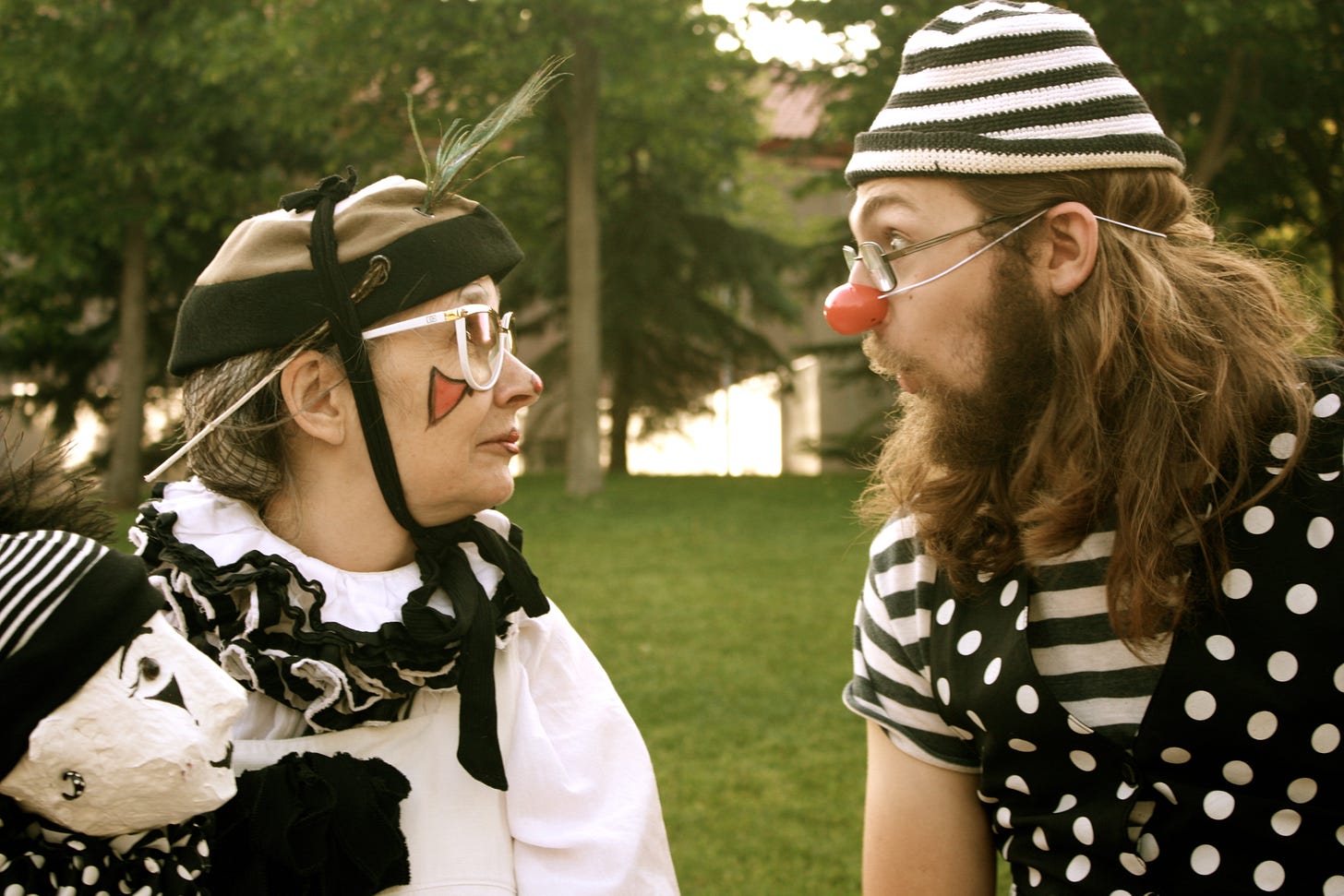Poor Clown
Not every clown gig is a success. In fact, sometimes the gigs are a dramatic failure but the clown always pops up again. They say we learn more from our mistakes than our successes.
In this issue: A paradox is being able to think about opposites at the same time. This is a clown’s specialty and playing with opposites can create humour. To see our lives in context social inclusion is important. Talking to each other is a political action. Although Pierrot is mute, she listens and communicates. Life goes on in the café. I used to watch ‘As the World Turns’ on TV. Here it was ‘As the Door Opens,’ at Mrs. Lipton’s.The Sorrow and Strength Story
Pierrot and The Bar Mitzvah
Being silent had its challenges! One time Pierrot was asked to go to a Bar Mitzvah by the Winnipeg International Children’s Festival Outreach. The Bar Mitzvah was in a back yard in River Heights with an apple tree and a high fence. There were a few teenagers and one boy about two years old. The rest of the people were dressed up and drinking cocktails. It was hard to think of what a mime clown might do.
Pierrot greeted everybody and then picked up an imaginary ball to play catch with the teens. They humoured me a little but then the two-year-old ran in and grabbed the mime ball, sat down with it, and wouldn’t throw it. We all laughed and Pierrot picked up another imaginary ball and began to throw it to the teens. The boy grabbed it and started screaming. His mother came over and gave me a terrible look and said to him, “Don’t play with the clown.” The teenagers turned around and ignored me.
When people don’t want to engage with a mime clown, all they need to do is turn their backs and it’s like the mime disappears because the mime can’t speak.
A beautiful older woman with Pierrot earings on, came over and told me that I should be mingling. I started going around to the groups of adults and tried to interact with them. They kept turning their backs on me, the older woman included.
I was feeling terrible. Then they brought out all kinds of wonderful desserts and started eating them. They brought out Rainbow sherbet, Nanaimo bars and Almond Thumbprint cookies. My favorite. Of course, the clown was not offered any, so I sat down beside them and ate imaginary food. They just ignored me. The hour was still not up. Finally I sat down in the grass against the wall of the house, feeling defeated. The man of the house came over and gave me some money and told me to leave. As Pierrot was leaving, crestfallen, the teens picked the apples and threw them at the clown.
Why did I ever want to be a clown? When I left the yard, I heard music, beautiful music. A few houses down, an older gentleman was sitting in a chair right in the middle of the sidewalk and playing the fiddle. It was magic. I felt the music go through me and Pierrot danced..
Popcorn Philosophy
The clown can create paradox by playing with opposites. From this paradox grows ambiguity, which can demonstrate that certainty is unreliable. Through making a space for questions, the role of the clown creates a sense of the potential for change. Sometimes clowns, tricksters, or jesters, by their station, were/are able to expose or make absurd controversial aspects of an accepted situation. Where this becomes confusing is when you look at many commonly held biases about clowns today. Through a separation of the concepts of meaning and entertainment, the role of the clown can lose its context of value to the culture. When this happens, integral presumptions are no longer explored and significant questions remain unasked.
Peacock Performance: Remembering Mrs. Lipton’s
It was amazing how some people took advantage of the relaxed atmosphere of Mrs. Lipton’s. One regular came in and ordered his usual breakfast of bacon and eggs, then used the phone book to make a few calls, while all remnants of his breakfast were taken away. When a new waitress was on duty, he ordered his whole breakfast over again. When he went to pay, he tried to pay for only one breakfast. It was surprising. Eventually staff learned that even regular customers would take advantage of any cracks in the system.
Behind the lunch counter was a very narrow space. One day one waitress told Karen that she was expecting a baby. Before Karen got over the shock, they were both surprised because the other waitress said that she was also expecting. The space behind the counter became narrower after that. They had to be very careful not to swing around and knock the green onions off of the counter with their bellies. As they got bigger, it was difficult for them to pass each other behind the counter. One of them would have to stand at the end and wait for the other one to go serve before they could get what they needed to serve the customers.
“Look at the size of that woman!” commented the woman who worked across the street to the milkman as they sat in the booth.
When one waitress brought her new born baby into the restaurant to show Karen, she put her on the counter beside the cash register. It was an old cash register that made a big Kathunkkk and jingle when you opened it. The baby didn’t startle. She was already used to that sound.
Odds & Ends - My Take on Clowning
Storytelling and listening can be an antidote to forces that separate and divide us from each other. Judith Butler writes about increasing privatization in her book, Notes Towards a Performative Assembly, “Shocking for many people who still live under the nominal framework of social democracy is the underlying presumption that individuals ought to care only for themselves, and not for others…” (12). Butler writes about the importance of social inclusion:
The more one complies with the demand of “responsibility” to become self-reliant, the more socially isolated one becomes and the more precarious one feels; and the more supporting social structures fall away for “economic” reasons, the more isolated one feels in one’s sense of heightened anxiety and “moral failure.” It involves an escalation of anxiety about one’s future and those who may be dependent on one; it imposes a frame of individual responsibility on the person suffering that anxiety; and it redefines responsibility as the demand to become an entrepreneur of oneself under conditions that make that dubious vocation impossible (15).
In sharing stories, individuals come to realize that they are not necessarily “a moral failure” and their individual anxiety can lessen as they realize there is a systemic problem to be addressed. Being part of a group that recognizes the larger problem, gives the individual agency to move forward. Each individual is interdependent in his relationships, community and socio-political environment.
References
Butler, Judith. Notes Toward a Performative Theory of Assembly. Harvard University Press, 2015.
Proctor, Sue. The Archetypal Role of the Clown as a Catalyst for Individual and Societal Transformation. https://spectrum.library.concordia.ca/id/eprint/977096/






